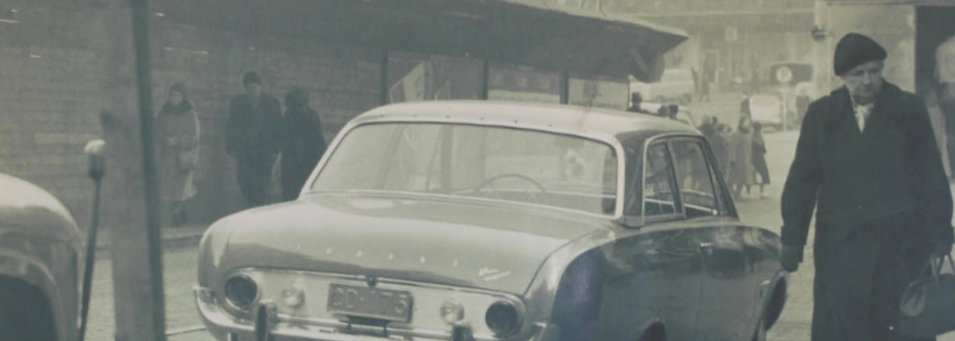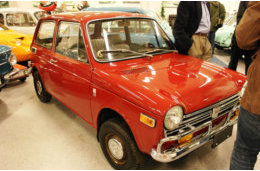














Economy rises


Bond Bug ES 700 - 1973
It is a wedge-shaped microcar, with a lift-up canopy and side screens instead of
canopy and side screens instead of conventional doors. Following the purchase
conventional doors. Following the purchase of Bond Cars Ltd., Reliant commissioned Tom
of Bond Cars Ltd., Reliant commissioned Tom Karen of Ogle Design to design a fun car. The
Karen of Ogle Design to design a fun car. The Bond Bug was based on Chief Engineer John
Bond Bug was based on Chief Engineer John Crosthwaite's newly designed chassis and
Crosthwaite's newly designed chassis and some Reliant Regal running gear. The original
some Reliant Regal running gear. The original concept was explored by chopping down a
concept was explored by chopping down a production Regal vehicle, the rear of the car
production Regal vehicle, the rear of the car being shortened to end over the rear axle.
being shortened to end over the rear axle. This prototype could be seen for many years
This prototype could be seen for many years later, languishing in the yard at the rear of
later, languishing in the yard at the rear of the factory, by anyone who cared to look
the factory, by anyone who cared to look through the chain-link fence from the canal
through the chain-link fence from the canal towpath.
towpath.


Fiat 126 - 1976
The Fiat 126 (Type 126) is a city car introduced in October 1972 at the Turin Auto
Show as a replacement for the Fiat 500.
introduced in October 1972 at the Turin Auto
Show as a replacement for the Fiat 500. Some were produced in Bielsko-Biała, Poland
Some were produced in Bielsko-Biała, Poland as the Polski Fiat 126p until 2000. It was
as the Polski Fiat 126p until 2000. It was replaced by the front-engined Fiat
replaced by the front-engined Fiat Cinquecento in 1993.
Cinquecento in 1993. The 126 used much of the same mechanical
The 126 used much of the same mechanical underpinnings and layout as its Fiat 500 rear-
underpinnings and layout as its Fiat 500 rear- engined predecessor with which it shared its
engined predecessor with which it shared its wheelbase, but featured an all new bodyshell
wheelbase, but featured an all new bodyshell closely resembling a scaled-down Fiat 127.
closely resembling a scaled-down Fiat 127.


Honda N600 - 1970
The Honda N360 is a kei car, designed and built by Honda and produced from March
built by Honda and produced from March 1967 through 1970, while the larger N600
1967 through 1970, while the larger N600 was marketed through 1973. After a January
was marketed through 1973. After a January 1970 facelift, the N360 became the NIII360
1970 facelift, the N360 became the NIII360 and continued in production until 1972.
and continued in production until 1972.





1970-1979
In the 21st century historians have increasingly portrayed the decade as a "pivot of change" in world history focusing especially on the economic upheavals. In the Western world, social progressive values that began in the 1960s, such as increasing political awareness and political and economic
upheavals. In the Western world, social progressive values that began in the 1960s, such as increasing political awareness and political and economic liberty of women, continued to grow. In the United Kingdom the 1979 elections resulted in the victory of its Conservative Party under Margaret Thatcher,
the first and to date only female British Prime Minister. Industrialized countries, except Japan, experienced an economic recession due to an oil crisis
liberty of women, continued to grow. In the United Kingdom the 1979 elections resulted in the victory of its Conservative Party under Margaret Thatcher,
the first and to date only female British Prime Minister. Industrialized countries, except Japan, experienced an economic recession due to an oil crisis caused by oil embargoes by the Organization of Arab Petroleum Exporting Countries. The crisis saw the first instance of stagflation which began a
caused by oil embargoes by the Organization of Arab Petroleum Exporting Countries. The crisis saw the first instance of stagflation which began a political and economic trend of the replacement of Keynesian economic theory with neoliberal economic theory, with the first neoliberal governments
political and economic trend of the replacement of Keynesian economic theory with neoliberal economic theory, with the first neoliberal governments being created in Chile, where a military coup led by Augusto Pinochet took place in 1973.
Novelist Tom Wolfe coined the term "'Me' decade" in his essay "The 'Me' Decade and the Third Great Awakening", published by New York magazine in
being created in Chile, where a military coup led by Augusto Pinochet took place in 1973.
Novelist Tom Wolfe coined the term "'Me' decade" in his essay "The 'Me' Decade and the Third Great Awakening", published by New York magazine in August 1976 referring to the 1970s. The term describes a general new attitude of Americans towards atomized individualism and away from
August 1976 referring to the 1970s. The term describes a general new attitude of Americans towards atomized individualism and away from communitarianism in clear contrast with the 1960s.
communitarianism in clear contrast with the 1960s. In Asia, affairs regarding the People's Republic of China changed significantly following the recognition of the PRC by the United Nations, the death of
In Asia, affairs regarding the People's Republic of China changed significantly following the recognition of the PRC by the United Nations, the death of Mao Zedong and the beginning of market liberalization by Mao's successors. Despite facing an oil crisis due to the OPEC embargo, the economy of Japan
Mao Zedong and the beginning of market liberalization by Mao's successors. Despite facing an oil crisis due to the OPEC embargo, the economy of Japan witnessed a large boom in this period, overtaking the economy of West Germany to become the second-largest in the world. The United States withdrew
its military forces from their previous involvement in the Vietnam War which had grown enormously unpopular. In 1979, the Soviet Union invaded
witnessed a large boom in this period, overtaking the economy of West Germany to become the second-largest in the world. The United States withdrew
its military forces from their previous involvement in the Vietnam War which had grown enormously unpopular. In 1979, the Soviet Union invaded Afghanistan which led to an ongoing war for ten years.
The 1970s saw an initial increase in violence in the Middle East as Egypt and Syria declared war on Israel, but in the late 1970s, the situation in the
Afghanistan which led to an ongoing war for ten years.
The 1970s saw an initial increase in violence in the Middle East as Egypt and Syria declared war on Israel, but in the late 1970s, the situation in the Middle East was fundamentally altered when Egypt signed the Egyptian–Israeli Peace Treaty. Anwar El Sadat, President of Egypt, was instrumental in the
Middle East was fundamentally altered when Egypt signed the Egyptian–Israeli Peace Treaty. Anwar El Sadat, President of Egypt, was instrumental in the event and consequently became extremely unpopular in the Arab World and the wider Muslim world. He was assassinated in 1981. Political tensions in
event and consequently became extremely unpopular in the Arab World and the wider Muslim world. He was assassinated in 1981. Political tensions in Iran exploded with the Iranian Revolution in 1979 which overthrew the Pahlavi dynasty and established an Islamic republic of Iran under the leadership
Iran exploded with the Iranian Revolution in 1979 which overthrew the Pahlavi dynasty and established an Islamic republic of Iran under the leadership of the Ayatollah Khomeini.
of the Ayatollah Khomeini. The economies of much of the developing world continued to make steady progress in the early 1970s, because of the Green Revolution. They might
The economies of much of the developing world continued to make steady progress in the early 1970s, because of the Green Revolution. They might have thrived and become stable in the way that Europe recovered after World War II through the Marshall Plan; however, their economic growth was
have thrived and become stable in the way that Europe recovered after World War II through the Marshall Plan; however, their economic growth was slowed by the oil crisis but boomed immediately after.
slowed by the oil crisis but boomed immediately after.


Photos mainly by Matti Kreivilä. Historical facts and technical details of the vehicles provided by Wikipedia. Movies YouTube.














